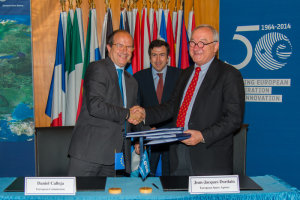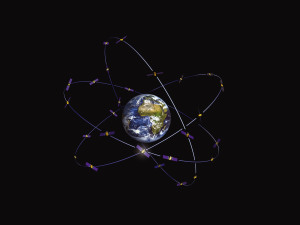With the Galileo constellation rapidly taking shape, the European Union has opened lines of communication with countries in North Africa and the Middle East with a view to assisting their governments and businesses to use the satellite services that extend across the Mediterranean. The services available to countries will be Galileo and EGNOS. The EGNOS system corrects typical GNSS errors such as the ionosphere disturbing the signal and slight discrepancies between the clocks to provide highly accurate positioning data and integrity information. Read more…
Tag Archives: European Commission
Signature ESA/EU Delegation Agreements
Jean-Jacques Dordain, ESA Director General, and Daniel Calleja Crespo, Director General for Enterprise and Industry at the European Commission, during the signature of the delegation agreement on the deployment phase of the European satellite radionavigation programme Galileo, and the signature of the 4th amendment to the delegation agreement on the further implementation of the European satellite navigation programme EGNOS, at ESA headquarters in Paris, on 16 July 2014.
Galileo GPS Agreement
European Commission Press Release Database (28 June 2004):
The European Union and the United States concluded an agreement on GALILEO and GPS at the end of the Summit held in Ireland on 26 June 2004. The agreement on the promotion, provision and use of the two satellite-based navigation systems and related applications that was signed by Commission Vice-President Loyola de Palacio and US Secretary of State Colin Powell, will allow each system to work alongside the other without interfering with its counterpart’s signals and thus give a huge boost to users worldwide. Vice-President Loyola de Palacio said: “This agreement will allow the European project GALILEO to become the world standard for civil and commercial use of satellite navigation; it will offer the best possible level of services to all users”.
After more than 4 years of intensive talks, the results for GALILEO, and, more importantly, users of GALILEO and GPS worldwide, are highly satisfactory. The agreement confirms that GPS and GALILEO services will be fully compatible and interoperable and therefore makes the joint use of GPS and GALILEO and the manufacturing of equipment much easier and cheaper.
GALILEO has now become the de facto world standard of open signals in the GNSS mass market. GALILEO will not need to rely on a “GALILEO-only” user community; instead it will be instantly accessible and used by millions of people who today use GPS. This means that all users of satellite radio-navigation will be able to simultaneously, with only one receiver, use one or the other of the two systems, or both at the same time.
In addition of being the first civil system specifically dedicated to civil users, the additional feature of GALILEO is its commercial nature. The agreement with the United States does confirm the quick introduction of GALILEO in all user segments (mass market and professional) throughout the world. The market potential is indeed considerable: 3 billion receivers and revenues of some € 250 billion per year by 2010 worldwide, and the creation of more than 150.000 high qualified jobs in Europe alone.
The agreement represents a major asset for the business case of the future GALILEO operator expected to finance at least two-third of the deployment of the system (€ 1.4 billion), one-third being financed by the public sector (€ 700 million). Such promising prospects will intensify the current competition between the three pre-selected consortia of companies which are running to get the concession to operate the system.
Results of this competition which is run by, the Galileo Joint Undertaking (the programme’s management-arm), will be disclosed by the Commission in October in view of a decision by the Council in December to move to the successive phases of the programme and open the way for the conclusion of the concession contract in 2005.
Finally, this agreement allows the last system specifications to be set, a crucial aspect for the swift operation of GALILEO. After the current development phase (2 satellites under construction will be launched by the end of 2005 and 2 shortly after), the deployment of the remaining 24 satellites (and related ground stations) is expected by 2008, date at which the system should start operation.
What is Galileo?
Galileo is a European Global Navigation Satellite System, providing high accuracy global positioning service. It is inter-operable with GPS (USA) and Glonass (Rusia). It will consist of 30 satellites (27 operational + 3 spares), positioned in 3 circular Medium Earth Orbit (MEO) planes at 23,222 km altitude above the Earth, and at an inclination of the orbital planes of 56º to the equator. It will provide good coverage even at latitudes up to 75º north, the most northerly tip of Europe. Read more…


